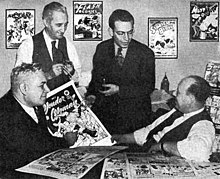Harry G. Peter
| Harry George Peter | |
|---|---|

|
|
| Born | March 8, 1880 California |
| Died | 1958 (aged 77–78) |
| Nationality | American |
| Area(s) | Penciller |
| Pseudonym(s) | H. G. Peter |
|
Notable works
|
Wonder Woman |
Harry George Peter (March 8, 1880 – 1958) was a newspaper illustrator and cartoonist known for his work on the Wonder Woman comic book and for Bud Fisher of the San Francisco Chronicle.
Harry George Peter was born in San Rafael, California, in 1880, the third of three children. Parents Louis and Louisa Peter were born in France, and his father worked as a tailor. At the age of twenty he drew newspaper illustrations under the name H. G. Peter, while answering to the nicknames "Harry" or "Pete". Working for the San Francisco Chronicle, he met Adonica Fulton, a staff artist for the San Francisco Bulletin who had studied at the Mark Hopkins Institute of Art. After moving to New York together in 1907, their pen-and-ink stye illustration, influenced by Charles Dana Gibson, earned them editorial work from magazines like the New York American and Judge. In 1912 they married.
His first work for comic books was through Lloyd Jacquet's comic shop, Funnies, Inc., where he illustrated such features as the biography of General George C. Marshall in True Comics #4 (September 1941). His first superhero was Man o' Metal in "Reg'lar Fellers Heroic Comics" (July, 1941).
His most lasting work came when the 61-year-old artist brought William Moulton Marston's Amazonian superheroine Wonder Woman to life on the pages of comic books (even though Peter went on to be uncredited in her creation) in December 1941. Peter notably changed his Gibson technique to an Art Nouveau-influenced cartooning style for the new series. In April 1942, he opened his own studio at 130 W. 42nd Street in Manhattan. In March 1944, the success of the Wonder Woman comics and newspaper strip led to the opening of the Marston Art Studio at 331 Madison Avenue at 43rd Street. The fourteenth floor studio, one floor above Marston's office, was run by office executive Marjorie Wilkes Huntley, who also contributed some inking and lettering. Joye Hummel went from being Marston's assistant to writing full scripts for the comic, the only other writer for Wonder Woman during the Golden Age. While Peter pencilled the stories, covers, and strips and inked the main figures, he was assisted by a series of female commercial artists who did background inking. The staff also included Helen Schepens as colorist, and Jim and Margaret Wroten as letterers, with some lettering done by daughter-in-law, Louise Marston.
...
Wikipedia
